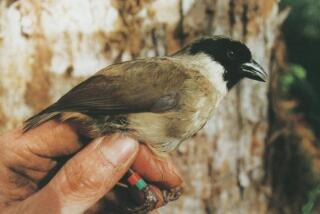Study finds link between long-lived humans and species extinction
- Share via
The longer humans live, the more likely they are to push other species to the brink of extinction and, conversely, spur the rise of invasive birds and mammals species.
That sobering news comes via a new study from UC Davis, published in the journal Ecology and Society. The research looked at more than two dozen variables in 100 countries—including political stability and availability of water—but concluded that human life expectancy was the key predictor of global extinctions and invasions.
The researchers found that as a country’s standard of living increased, so did the number of invasive animals.
Among the other findings:
--New Zealand, the United States and the Philippines had among the highest percentages of endangered and invasive birds.
--New Zealand had the highest percentage of all endangered and invasive species combined, the study found, largely a consequence of its “lack of native terrestrial mammals.”
--African countries had the lowest percentage of invasive and endangered birds and mammals, which the study attributed to limited international trading.
Twitter: @julie_cart







